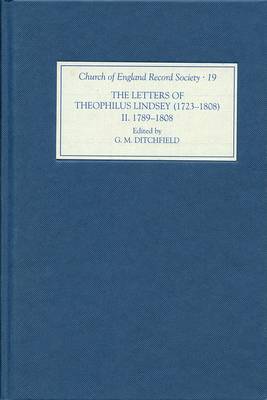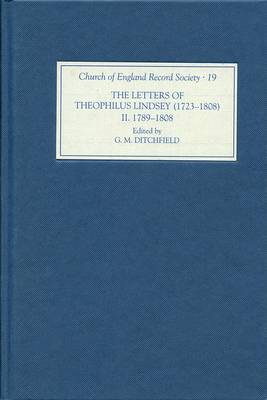
- Afhalen na 1 uur in een winkel met voorraad
- Gratis thuislevering in België vanaf € 30
- Ruim aanbod met 7 miljoen producten
- Afhalen na 1 uur in een winkel met voorraad
- Gratis thuislevering in België vanaf € 30
- Ruim aanbod met 7 miljoen producten
The Letters of Theophilus Lindsey (1723-1808)
Volume II: 1789-1808
Omschrijving
Letters of an important clergyman that provide a well-informed and lively commentary upon the religion, politics and society of the time.
The letters of Theophilus Lindsey (1723-1808) illuminate the career and opinions of one of the most prominent and controversial clergymen of the eighteenth and early nineteenth centuries. His petitions for liberalism within the Church of England in 1772-3, his subsequent resignation from the church and his foundation of a separate Unitarian chapel in London in 1774 all provoked profound debate in the political as well as the ecclesiastical world. His chapel became a focal point for the theologically and politically disaffected and during the 1770s and early 1780s attracted the interest of many critics of British policy towards the American colonies. Benjamin Franklin, Joseph Priestley and Richard Price were among Lindsey's many acquaintances.
/p>
The second and final volume of this edition covers the period from the regency crisis and the early stages of the French Revolution to Lindsey's death nineteen years later, at the height of the Napoleonic War. His letters from this period reveal in depth Lindsey's central role in the formation of Unitarianism as a distinctive denomination, his involvement in movements for religious and political reform, his close friendship with Joseph Priestley and the tribulations of dissenters during the 1790s. From his vantage point in London, Lindsey was a well-informed and well-connected observer of the responses in Britain to the French Revolution and the war of the 1790s, and he provides a lucid commentary on the political, literary and theological scene.
Specificaties
Betrokkenen
- Uitgeverij:
Inhoud
- Aantal bladzijden:
- 1024
- Taal:
- Engels
- Reeks:
- Reeksnummer:
- nr. 19
Eigenschappen
- Productcode (EAN):
- 9781843837428
- Verschijningsdatum:
- 20/12/2012
- Uitvoering:
- Hardcover
- Formaat:
- Genaaid
- Afmetingen:
- 236 mm x 157 mm
- Gewicht:
- 2041 g

Alleen bij Standaard Boekhandel
Beoordelingen
We publiceren alleen reviews die voldoen aan de voorwaarden voor reviews. Bekijk onze voorwaarden voor reviews.










